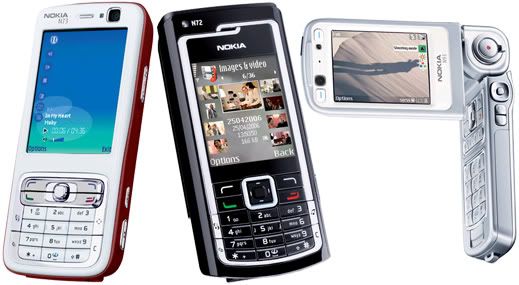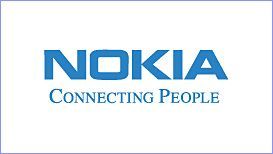The Second Coming
Monday, July 31, 2006
 The story of 3G till now has been a dismal one. It all started with the phenomal success of the WCDMA service introduced by DoCoMo of Japan. It was huge hit amongst it subscribers initially and was a pre standard version of UMTS. That lead to a wild hype about the market potential of 3G UMTS and the spectrum auctions in Europe saw Telcos. bidding astronomical sums for the licenses. Together it raised around 129 Billion USD!
The story of 3G till now has been a dismal one. It all started with the phenomal success of the WCDMA service introduced by DoCoMo of Japan. It was huge hit amongst it subscribers initially and was a pre standard version of UMTS. That lead to a wild hype about the market potential of 3G UMTS and the spectrum auctions in Europe saw Telcos. bidding astronomical sums for the licenses. Together it raised around 129 Billion USD!Then came the 2000 slump. The Dot Com bust also had a huge effect on the Telecom Infrastructure comapnies and the Telco's themselves. That delayed the launch of 3G services to late 2004 and since then the 3G has not been the money spinner that everyone had predicted. Things have come to a pass now and some operators have given up on deploying 3G completely. Others have initiated legal actions against the Telecom Regulators to recover their investments.
Several of the hyped up services, like video calling and broadband speeds were non starter's from the begining; not as popular as in Japan. But according to Vodafone, Mobile TV has been showing a lot of promise lately. Several trials of Mobile TV have been completed and have reported encouraging results. The recent World Cup matches were a big hit.
In the meantime technologies like WiFi and WiMAX have also appeared on the scene and are threating 3G services directly. Mobile WiMAX is being marketed as the 3G killer with it superior performance and range. The hype machines have been working overtime on it. The Internet based free VoIP services have also seen a resseruction of sorts. Skype rode the wave with immaculate timing and its popularity is being seen as threat to the Telcos.
Still the Asian Operators are looking optimistically at 3G UMTS. They regulators have learnt from the mistakes and have refrained from auctioning the spectrum. That has kept the plans inexpnsive and the Operators themselves are billing 3G as an incremental update rather than the a vastly superior technology (which ironically it is!). The technology itself has matured over time and the equipment costs have come down. The handsets have become more sexier and are already attracting users to it.
There are hopes now that 3G will redeem itself in Aisa; the place it had started off from.
Technorati Tags: 3G, DoCoMo, UMTS, License, Spectrum, WiFi, WiMAX, Mobile TV, Europe, Asia
Comprehesive Defeat
 Going by the reports Freescale it seems has abandoned its Ultra Wide Band efforts. Earlier it had pulled out of the UWB Forum which had led to the disbanding of the IETF working group. Since then Freescale has been quiet on UWB and has delayed the launch of the UWB chipset to the end of 2007. Already there is specualtion that it will never happen given that the rival MB-OFDM solutions will already be on the market by then.
Going by the reports Freescale it seems has abandoned its Ultra Wide Band efforts. Earlier it had pulled out of the UWB Forum which had led to the disbanding of the IETF working group. Since then Freescale has been quiet on UWB and has delayed the launch of the UWB chipset to the end of 2007. Already there is specualtion that it will never happen given that the rival MB-OFDM solutions will already be on the market by then.The rival group, WiMedia Alliance backed by Intel on the other hand has already teamed up with ECMA International and its Multi Band OFDM UWB standard is being backed by USB Implementers Forum. It has been gianing steady traction with startups like WiQuest, Wisair, Alereon, Staccato and established players like Infineon announcing USB Silicion solutions. Freescale's partners in crime, Gefen and Belkin have already deserted it and moved to chip solutions from the WiMedia group.
The UWB war has been fully played out then leading to Intel trouncing Freescale. As they say, in Cricket, timing is everything.
Technorati Tags: UWB, Freescale, WiMedia, WUSB, Intel
ADSL Modem In Ubuntu
Friday, July 28, 2006
 Ubuntu keeps on impressing. I have a Beetel 220BX ADSL2 Modem which came with my Airtel connection. It has has an ethernet connector as well as an USB connector. I had previously tried to get my Fedora Core 5 installation working with the USB connector but failed. I was anxious whether it would work in Ubuntu or not after I read the wiki which said that its best to use the Ethernet connection!
Ubuntu keeps on impressing. I have a Beetel 220BX ADSL2 Modem which came with my Airtel connection. It has has an ethernet connector as well as an USB connector. I had previously tried to get my Fedora Core 5 installation working with the USB connector but failed. I was anxious whether it would work in Ubuntu or not after I read the wiki which said that its best to use the Ethernet connection!But then I read the Home Networking Wiki which had some more pointers. Finally it was as easy as running the live CD with the USB Modem connected. It generated the /etc/network/interfaces file which lists down the physical interfaces and the rules to bring them up. All I had to do was to copy the file to my hard drive installation and the modem was running on USB!
It was a breeze. The love increases.
Technorati Tags: Ubuntu, ADSL, USB, Fedora, Linux, FOSS
Sprint's Sprectrum
Thursday, July 27, 2006
 Some indication on which way Sprint might swing with respect to is 2.5 GHz spectrum. Clearwire and Sprint together own most of the 2.5 GHz spectrum in US and Intel recently propped it up with a $ 600 Million investment in it. Motorola is already a Clearwire's equipment supplier due to its acquisition of NextNet, Clearwire's equipment division. In effect making a good case for Sprint to use nomadic or mobile WiMAX and offer interoperability with Clearwire's network.
Some indication on which way Sprint might swing with respect to is 2.5 GHz spectrum. Clearwire and Sprint together own most of the 2.5 GHz spectrum in US and Intel recently propped it up with a $ 600 Million investment in it. Motorola is already a Clearwire's equipment supplier due to its acquisition of NextNet, Clearwire's equipment division. In effect making a good case for Sprint to use nomadic or mobile WiMAX and offer interoperability with Clearwire's network.If that happens it will be another setback to Qualcomm which has been trying to make a case for its propreitary Flash-OFDM technology. QC has tried to legitimise the technology as 802.20 IETF Standard but the working group was suspeneded due to allegations of misconduct. But Nextel (which Sprint merged with) has already trailled Flash OFDM and is reportedly considering it for nationwide deployment.
The future of WiMAX depends upon which way Sprint goes. At least in the US.
Technorati Tags: Sprint, Clearwire, WiMAX, Flash OFDM, Intel, Motorola, Qualcomm
OLPC FUD
 India thinks spending on secondary education is better than giving laptops to children. Lots of reasons have been quoted, the most quotable among them being that it is "paedagogically suspect". That means that there is no proof that it can help children learn by themselves. It actually goes a step further and states that
India thinks spending on secondary education is better than giving laptops to children. Lots of reasons have been quoted, the most quotable among them being that it is "paedagogically suspect". That means that there is no proof that it can help children learn by themselves. It actually goes a step further and states that"It may actually be detrimental to the growth of creative and analytical abilities of the child."But the real gem lies at the end of the story.
“We do not think that the idea of Prof. Negroponte is mature enough to be taken seriously at this stage, and no major country is presently following this,”Now it gets a bit personal. They are hinting that Prof. Negroponte is a nutcrack and nobody has really bought into his idea. Steve Jobs (science project), Bill Gates (hand crank!) and Craig Barret (gadget) certainly dont.
And finally
“Even inside America, there is not much enthusiasm about this.”So that really seems to be the reason. America is not buying the laptops, and hence we should not as well!
A classic example of FUD!
Our babus are scared of something. Maybe they sense that they will not get a cut out of the whold deal. After all the money spent in setting up more secondary schools would warm up their coffers. The OLPC just bypasses the whole establishment and makes it pointless. That is scary.
That infact is a proof of why OLPC is going to work in third world countries. It will enable a generation of kids to pull themseleves and their soceity out of poverty. The establishment has failed them. And the OLPC gives them an opportunity to work around it. Who needs ministers, babus, teachers and peons.
Linux is enough.
read more | digg story
Update: A feature from Wired on the design process of OLPC.
Update 2: Slashdot disucssion on the topic.
Previous Posts: Open Source Generation. OLPC Update. One Laptop Per Child.
Technorati Tags: India, OLPC, MIT Lab, Negroponte, FUD
Super Intelligent Devices
Tuesday, July 25, 2006
 The July edition of MoMo Bangalore was held yesterday at the Aztec Soft. premises. It was a full house with a diverse group of participans from the Mobile Industry in Bangalore. We had two sepakers, Sujai Karampuri and Deepak Jaiswal speaking on Next Generation Networks and Mobile Value Added Services. And their talks led to an open discussion amongst participants which threw up quite a lot number of views and counterviews.
The July edition of MoMo Bangalore was held yesterday at the Aztec Soft. premises. It was a full house with a diverse group of participans from the Mobile Industry in Bangalore. We had two sepakers, Sujai Karampuri and Deepak Jaiswal speaking on Next Generation Networks and Mobile Value Added Services. And their talks led to an open discussion amongst participants which threw up quite a lot number of views and counterviews.One of the most interesting discussion was about where the complexity and intelligence should reisde, the network or the terminal. People with a telecom network background will readily agree that all the intelligence lies at the network. The reason being, the devices were and are not really powerful yet. And it makes business sense to the telcos. to spend much more on a single box which serves a number of devices.
But the telco's also want to control the content and usage of these devices. Anything that cannot be charged or monitored is a strict no no for them. Recently this duel between the Telcos and OEM's have been highlighted by the dual mode phones that Nokia introduced. They can work either on a WiFi hotspot or a 3G network and handoff's are supported seamlessly. The telco's are not very happy about it.
This battle of where the intelligence lies has been fought and lost in the wired world. The cable companies prevailed because they were able to make money out of it. But the story is not over by any means. Cognitive radios using Mobile Adhoc Networks do not require any carrrier. It is currently the holy grail of telecom research and every university woth its name is working on it. It will percolate into commercial products one day.
The only question is can we find viable business models around it.
Update: Rajan's post on the same topic.
Technorati Tags: MoMo Bangalore, Mesh Networks, MANET, Cognitive Radios, Telcos., Academic Research
Missing VC Ecosystem
Saturday, July 22, 2006
 An article from Business Week on the various aspects of Venture Capital has promped this post. The VC's are a much hated creed amongst the Enterpreneur cirlces. They simply refuse to listen, think that they are the last word on business and can put in the crucial word with others on you. The VC's on the other hand think of entrepreneurs as naive about business and out of tune with the market requirements. But both of them cannot do without each other. Finally its the entrepreneur who brings money into the VC's coffer.
An article from Business Week on the various aspects of Venture Capital has promped this post. The VC's are a much hated creed amongst the Enterpreneur cirlces. They simply refuse to listen, think that they are the last word on business and can put in the crucial word with others on you. The VC's on the other hand think of entrepreneurs as naive about business and out of tune with the market requirements. But both of them cannot do without each other. Finally its the entrepreneur who brings money into the VC's coffer.In India right now the VC ecosystem has not really developed yet. Not many are there in India in the first place and all the big names are based out of the Valley. There is a big dearth of early stage investors as well. One of the most crucial elements of the ecosystem, the Angel Investors are also missing. The older generation of entrepreneurs came out of the manufacturing or the retail industry. Even some of the VC's are also from the investment banker backgrounds. Not many are ex-entrepreneurs. That leaves a void for startups in India who need early stage capital to get their product out and rolling.
Things are looking up but. A lot of attention is focussed on India at this moment. Hopefully things will fall into place soon and we will see some really bold plans getting funded.
Technorati Tags: Venture Capital, Entrepreneurship, Startups, India
On Walled Gardens
Friday, July 21, 2006
 Business Week tries to examine the reasons behind the pranoid reactions to innovation in the Telco world. The Telcos are gorillas and everybody is ready to dance for them. The have a regular stream of income and have grown big and fat sitting on them. The spectre of losing this income stream is a very dangerous for them. The reaction; shutting out innovation. They say in marketing circles, technology is only the enabler. But in the Telco. world its more like a threat.
Business Week tries to examine the reasons behind the pranoid reactions to innovation in the Telco world. The Telcos are gorillas and everybody is ready to dance for them. The have a regular stream of income and have grown big and fat sitting on them. The spectre of losing this income stream is a very dangerous for them. The reaction; shutting out innovation. They say in marketing circles, technology is only the enabler. But in the Telco. world its more like a threat.The downside of this is obviously they are stuck in a gut. They do not really know how to come out of it and provide better serivces to their customers. The internet and wireless technologies on the other hand have taken a great strides. Internet base VoIP companies started the trend of free voice calls and now the cable companies have adopted it. The triple play offering of Voice, Video and Data enables them to directly compete with the Telcos. With Wireless technologies moving towards incorporating mobility, the mobile advantage is also under threat.
A classic example of the Walled Garden approach and how it creates its own set of problems.
Update: A nice examination on the causes by Ars Technica.
Technorati Tags: Business, Telco, Telecoms, Innovation, Cable Companies, VoIP, Triple Play
A New Nokia
Thursday, July 20, 2006
 Forbes goes behind the scenes in the Nokia Developer Conference to find out more about the state of things at Nokia. And the scorecard looks very good. It almost gushes at Nokia. The sucess of N Series is a foregone conclusion and Nokia is set to dominate the Smartphones market. The market itself is as big as half a million devices per year!
Forbes goes behind the scenes in the Nokia Developer Conference to find out more about the state of things at Nokia. And the scorecard looks very good. It almost gushes at Nokia. The sucess of N Series is a foregone conclusion and Nokia is set to dominate the Smartphones market. The market itself is as big as half a million devices per year!The recent moves of the new CEO's have earned a lot of praise. Nokia is the second biggest player in the infrastructure and equipment market. But that used to contribute around 10% of its margins. That has been spun off as a seperate division now along with Siemens. In the CDMA market it was a bit player and it chose to walk away from it.
And now its ambition is to dominate the Smartphones market and content distribution. A aggresive positioning.
Update: Motorola is giving Nokia a serious run for its money.
Technorati Tags: Nokia, GSM, Smartphone, CDMA
Mobile TV In Canada
 The Globe And Mail reports about the rising interest of cosumers and Telco's on Mobile TV in Canada. There are already three carriers there who are offering MobiTV's content on cell phones; Bell Mobility, Telus and Rogers. The service is in the early adopter phase and nobody's revealing the numbers yet. But the interest generated by it has already resulted in acquisition. CHUM Ltd. which is into mobile TV content was bought by Bell Gloemedia (owner of The Globe and Mail).
The Globe And Mail reports about the rising interest of cosumers and Telco's on Mobile TV in Canada. There are already three carriers there who are offering MobiTV's content on cell phones; Bell Mobility, Telus and Rogers. The service is in the early adopter phase and nobody's revealing the numbers yet. But the interest generated by it has already resulted in acquisition. CHUM Ltd. which is into mobile TV content was bought by Bell Gloemedia (owner of The Globe and Mail).The content is in the form of short clips; sports, entertainment, news updates, which can be viewed easily on the go. Content creation also takes into account the small screens and sound and camera angles. The format has not been extended to full length shows yet. Typical seeding of the market. The demand for full length features will rise once the intial adoption phase is over.
But no sign of any business model around it yet. The players agree that its too early stage for that! Still it offers valuable insights on how mobile TV is going to get adopted in other markets. Anybody into mobile content creation right now should sit up and take notice.
Technorati Tags: Mobile TV, MobiTV, Bell Mobility, Telus, Rogers, CHUM Ltd., Canada
Ubuntu Rocks!
Monday, July 17, 2006
 I recently switched to Ubuntu from Fedora; thanks to a corrupt fstab which happened when I was playing around with the partitions. Note to myself: never use the gui to create partitions in Linux. Thankfully I had taken a backup of all my data and I was able to recover them with the help of a friend. But after switching to Ubuntu, I have fallen in love with it.
I recently switched to Ubuntu from Fedora; thanks to a corrupt fstab which happened when I was playing around with the partitions. Note to myself: never use the gui to create partitions in Linux. Thankfully I had taken a backup of all my data and I was able to recover them with the help of a friend. But after switching to Ubuntu, I have fallen in love with it.I simply love the look and feel of Ubuntu. It seems so much more slickier! The default font (Sans) is simply great to read. The web pages look much better in them. Amazingly the browsing experience also has been better than Fedora. The Yahoo Mail Beta no longer sucks. The installation of the fglrx driver for my ATI videocard was also a breeze; the instructions worked like magic. In fedora I had to struggle and finally gave up.
But amazingly Dapper does not install Open Office by default! I was surprised that it was not there at all and had to use Synaptic to install the Open Office suite. And the default media player, totem cannot does not play a host of file. So had to install mplayer from apt-get and the essential codecs seperately!
Considering this is a free software project, its simply a great effort. Thank you Ubuntu.
Update: I discovered Ubuntu India! Sign up quick.
Technorati Tags: Ubuntu, FOSS, GNU/Linux, fglrx
Another Network Computer
Friday, July 14, 2006
 Network computers are once again a hot technology. With broadband available cheaply and talks of Internet based OS's doing the rounds, they have seen a rebirth. There are several startups in the fray, NComupting being prominent amongst them. And now Microsoft is joining in the fray. They have released a network computer version of Windows XP to be used on old antiquated hardware.
Network computers are once again a hot technology. With broadband available cheaply and talks of Internet based OS's doing the rounds, they have seen a rebirth. There are several startups in the fray, NComupting being prominent amongst them. And now Microsoft is joining in the fray. They have released a network computer version of Windows XP to be used on old antiquated hardware.The focus is more on preserving old customers who do not want to upgrade to newer versions of Window's. But still its a Network Computer. A unique approach to network computing I would say. It might stop a lot of people to just switch to Linux for old PC's while still retaining the benefits of Windows. Would work for small businesses.
But it could be used for other purposes as well. Maybe just for surfing. Or for working with Google's upcoming Online Office Productivity suite!
read more | digg story
Technorati Tags: Microsoft, NComputing, Network Computer, WinXP, Linux, Google,
Skype Cracked
 The Chinese have pulled off another reverse engineering feat. They have cracked the skype protocol. Skype uses a propreitary version of SIP protocol which can enables it to bypass Firewalls and more importantly NAT. A company in China has come up with a thier own Skype client which can be used as ordinary host nodes and connect with any other Skype clients. It does not support the supernode feature yet (which routes calls from other skype hosts). The code is not public yet.
The Chinese have pulled off another reverse engineering feat. They have cracked the skype protocol. Skype uses a propreitary version of SIP protocol which can enables it to bypass Firewalls and more importantly NAT. A company in China has come up with a thier own Skype client which can be used as ordinary host nodes and connect with any other Skype clients. It does not support the supernode feature yet (which routes calls from other skype hosts). The code is not public yet.It was only a matter of time. Skype by far is the most popular VoIP service today. There are around 5 Million users of Skype. It generated a lot of attention after the ebay buyout and even earned some patent infringement suits. The telcos' love to hate it. The Chinese goverment has gone a step ahead and banned the use of Skype. Nothing would please them more to come up with their own clone.
Skype has grown because of the Walled Garden approach it has followed till now. Now the walled garden itself is under threat. It would be nice to see an open version of the Skype protocol and how Skype responds to it.
PS: A good technical description of the Skype protocol (PDF).
Technorati Tags: Skype, VoIP, SIP, Protocol, China, eBay
MobiQC
Wednesday, July 12, 2006
 Its all over the news today. MobiTV has raised a whopping 70 million in Series C Funding round! Given the market predictions for Mobile TV everything in this sector is pretty hot. But still raising this kind of money needs a lot of capability. Given the amount of returns VC's look for during investment, MobiTV must make billions in 3 to 5 years. Could pretty much come true.
Its all over the news today. MobiTV has raised a whopping 70 million in Series C Funding round! Given the market predictions for Mobile TV everything in this sector is pretty hot. But still raising this kind of money needs a lot of capability. Given the amount of returns VC's look for during investment, MobiTV must make billions in 3 to 5 years. Could pretty much come true.But before that happens, it could get acquired by someone. And GigaOM not so subtly points us to who might that be. Makes sense. QC has its own big bets on Mobile TV and MediaFLO. It has been aggresively marketing MediaFLO but it hasnt really overtaken the market yet. With antagonism against QC rising because of the high royalty charges and a general trend of open standards based technologies, it had to happen.
Acquiring a startup to push its own technology would change the game big time though.
Previous Posts: Mobile TV Update. Mobile TV Roadblocks.
Tags: MobiTV QC MeidaFLO DVB-H
Types of Genius'
Tuesday, July 11, 2006
 A new theory suggests that creativity comes in two distinct types; quick and dramatic, or careful and quiet. Typically they are known as the innovator and the experimenter. The innovators are the one's who fundamentally change the rules of the game early in their life. The experimenters are the one who follow the process of trial and error before producing groundbreaking works in their own disciplines.
A new theory suggests that creativity comes in two distinct types; quick and dramatic, or careful and quiet. Typically they are known as the innovator and the experimenter. The innovators are the one's who fundamentally change the rules of the game early in their life. The experimenters are the one who follow the process of trial and error before producing groundbreaking works in their own disciplines.These ideas may yield clues about how to foster fresh thinking in a wide range of organizations, industries, and disciplines.
read more | digg story
Tags: Innovation Entrepreneurship
VoIP Soft Phones
Monday, July 10, 2006
 In India, VoIP is regulated. You cannot terminate a VoIP call to a PSTN or issue a VoIP number. Neither can you offer VoIP based International Long Distance calls commercially. In effect, the consumers are deprived of a cheap telephony options. Thankfully PC to PC and PC to landline calls outside of India are still allowed. That is why you dont get fined for using Skype.
In India, VoIP is regulated. You cannot terminate a VoIP call to a PSTN or issue a VoIP number. Neither can you offer VoIP based International Long Distance calls commercially. In effect, the consumers are deprived of a cheap telephony options. Thankfully PC to PC and PC to landline calls outside of India are still allowed. That is why you dont get fined for using Skype.But usage of Vonage boxes are still allowed. You can have a US number, use broadband to connect it to the Vonage box in India and happily call any landline number in US through it. It give us a virtual presence in US itlsef. A boon for people with relatives in US.
The userbase of Vonage is growing in India for this particular reason. Its an classic example of disruptive marketing model. They have not invested in any marketing campaign targeting Indian users but the number of Vonage users located in India will still be significant. They have created a market for themselves.
Which leads us to another business opportunity. How difficult is it to create USB SoftPhone which can be used with Skype or Vonage? Given the popularity of these services, a cordless phone which uses Vonage or Skype as it backend, over a WiFi network would be a big hit. Something to think about!
Tags: VoIP India Internet Telephony Vonage Packet8 Skype
Intel Strikes
Thursday, July 06, 2006
 Intel and Motorola have announced a mammoth investment in Clearwire, a WiMAX based wireless service provider in US. That has resulted in Clearwire canelling its IPO plans. Apart from Intel and Motorola coming together to back WiMAX and it being Intel's biggest investment till date, its being seen as more of a strategic move against Qualcomm. QC wants to push it own 802.20 Mobile-Fi technology in place of WiMAX.
Intel and Motorola have announced a mammoth investment in Clearwire, a WiMAX based wireless service provider in US. That has resulted in Clearwire canelling its IPO plans. Apart from Intel and Motorola coming together to back WiMAX and it being Intel's biggest investment till date, its being seen as more of a strategic move against Qualcomm. QC wants to push it own 802.20 Mobile-Fi technology in place of WiMAX.Intel has bet all its cards on WiMAX. It sees its core business of desktop chips being replaced with mobility solutions in the future. The WinTel partnership has withered with time and even Microsoft sees the mobile platform as the next big money spinner. That led it to partner with Qualcomm. To survive Intel needs significant control of the WiMAX technology which it sees as the successor to WiFi. The success or failure of WiMAX will dictate the future of Intel more than anything.
The ball is now in QC's court.
Previous posts: The 802.20 Soup. Emergence Of QualSoft.
Tags: Intel Motorola Clearwire WiMAX Mobile-Fi QC
A New Blog
Wednesday, July 05, 2006
 Tech Blogging is on the rise in India. Sujai, a good friend of mine and already a very popular blogger at E=mc^2 has started another blog about Wireless Industry and Entrepreneurship in India. The first post is on the touchy topic of getting funded by a VC in India. Sujai himself is an entrepreneur who runs Sloka Telecom and has a lot to say on this. Looking forward to many more insights from him.
Tech Blogging is on the rise in India. Sujai, a good friend of mine and already a very popular blogger at E=mc^2 has started another blog about Wireless Industry and Entrepreneurship in India. The first post is on the touchy topic of getting funded by a VC in India. Sujai himself is an entrepreneur who runs Sloka Telecom and has a lot to say on this. Looking forward to many more insights from him.Hop over and have a dekko.
Tags: Enterpreneurship Bangalore India
Ganging Up
Tuesday, July 04, 2006
 Its raining complaints for Qualcomm nowadays, this time in Korea. FT informs us that TI and Broadcom have officially joined the gang today. The complaint is against its anti competitve practices. It turns on the heat against QC with EU also looking into similar allegations. The word is that an investigation is inevitatble.
Its raining complaints for Qualcomm nowadays, this time in Korea. FT informs us that TI and Broadcom have officially joined the gang today. The complaint is against its anti competitve practices. It turns on the heat against QC with EU also looking into similar allegations. The word is that an investigation is inevitatble.The screws are tightening for Qualcomm.
Previous Posts: A Losing Battle.
Update: GigaOm on this topic.
Tags: QC TI Broadcom IPR Royalties WCDMA
Cute Bug
Monday, July 03, 2006
You dont know what you are going to land up while aimlessly surfing.
Cute Bug it seems!
Via: The Register.
Early voice-enabled devices exhibited some cute bugs. In one case, the phone would lock on receiving an incoming call from a caller with whose name begins with a letter at the wrong end of the alphabet. The software would begin to traverse the phone book, so it could display the Called ID, and then lock by the time it got the Vs and Ws.
This was a terrific boon to say, Polish users with many friends or relatives whose names begin with "V" and "W", and who wanted to be left alone - but of little use to anyone else.
Cute Bug it seems!
Via: The Register.
A Losing Battle
Sunday, July 02, 2006
 The Register examines the reasons and implications of Nokia's withdrawal from the CDMA handset business. It goes back in time and points out Nokia's big mistake when it decided to go with its own silicon. That move backfired on them and the results can be seen now. It ended up souring its relationship with Qualcomm and Nokia (along with TI and STMicro) could not match the price point of QC chips. Nokia had also bet upon the EVDV protocol as an evolutionary path to CDMA2000 and QC effectively buried it with its own EVDO roadmap.
The Register examines the reasons and implications of Nokia's withdrawal from the CDMA handset business. It goes back in time and points out Nokia's big mistake when it decided to go with its own silicon. That move backfired on them and the results can be seen now. It ended up souring its relationship with Qualcomm and Nokia (along with TI and STMicro) could not match the price point of QC chips. Nokia had also bet upon the EVDV protocol as an evolutionary path to CDMA2000 and QC effectively buried it with its own EVDO roadmap.QC's much debated stand on royalties is also examined. It started with the Korean telecom's, who were the first operators outside of US to embrace the CDMA technology, complained about the high amount of royalties (~ 3 Billon USD) it paid over the a decade. It also contributed to Telstra's, Reliance's and Vivo's move away from CDMA. Although the bigger factor there was the success of GSM in the emerging economies because of the price advantage.
MoCo News rightly points out that the battle is of high stakes here. It will end up shaping the future of mobile industry as whole. And its not over by any means. Nokia may have raised questions about the business case of CDMA but QC is working hard to promote its own version on OFDM. A lot will depend upon Sprint's decision on the technology choice for its 2.5 GHz spectrum. Sprint used to be one of the biggest backers of EVDV but QC was able to persuade them to move away from it. Reportedly they invited Sprint and showcased their own vision of EVDO Rev A which was way superior to EVDV. Sprint was easily won over. It will not be as easy this time around.
QC in the meanwhile is fighting several other battles. There has been a change at the helm and Paul Jacobbs has stepped in at a tumultous time. A full EU investigation (ala Microsoft) against its monopolistic business practices is likely. IEEE has suspended the working group of Mobile-Fi because of allegations of bribery by QC. Its fighting a trenched battle against Intel's WiMAX standard which aims to rival QC's dominance of CDMA technology. There are rumblings about QC contemplating a breakup of its operations!
But times have changed. Nobody anymore wants a propreitary standard like IS-95. The trend nowadays is of Open Standards in which the essential technologies are patent free. The dynamics are much different now with many more players in the field than the IS-95 days. Maybe QC is fighting a losing battle here.
Previous Posts: Nokia Pulls The Plug. The 802.20 Soup. Battle Lines. Emergence of QualSoft.
Tags: Nokia QC CDMA OFDM WiMAX Intel
Indian VC Scene
 Sramana Mitra is running a series on Indian Entrepreneurship and Venture Capital with insightful posts on the subject. Do check it out here and here. It highlights my pet peeve about seed stage capital missing in India. Good to see someone trying to put it in focus. Hopefully people are going to sit up and take notice (and i'll get my seed funding :)).
Sramana Mitra is running a series on Indian Entrepreneurship and Venture Capital with insightful posts on the subject. Do check it out here and here. It highlights my pet peeve about seed stage capital missing in India. Good to see someone trying to put it in focus. Hopefully people are going to sit up and take notice (and i'll get my seed funding :)).Tags: Venture Capital India
Mobile TV Update
 Another day and news of another Mobile TV Trial, this one in Australia. The results once again are encouraging and seemingly identical to the Helsinki Trial results. The technology was DVB-H and it proved to be a hit amongst commuters with sport being the most popular content. Expected as Australia did very well in this World Cup.
Another day and news of another Mobile TV Trial, this one in Australia. The results once again are encouraging and seemingly identical to the Helsinki Trial results. The technology was DVB-H and it proved to be a hit amongst commuters with sport being the most popular content. Expected as Australia did very well in this World Cup.But Analysys is offering a word of caution to the Operators. They are enthusiastic about its potential but they are advising the operator to choose a cheaper option till the pricing plans mature. It advocates the adoption of TDtv which does not need any new spectrum for the operators but offers less channels. Orange is already testing the technology.
Positive news from all around!
Previous Posts: Mobile TV Roadblocks.
Tags: Mobile TV DVB-H TDtv Telivision
VoIP Mobile Phones
 A market research by In-Stat predicts that the demand for WiFi phones which can do VoIP calls as well will increase as more and more operators try to attract users with unlimited data plans over their 3G networks. Nokia has already embraced this and launched WiFi capable phones of their own. It has also demonstrated the UMA technology which offers seamless handover of VoIP calls to a GSM/GPRS network. Skype already has installers for Pocket PC and GTalk can be used on Blackberry.
A market research by In-Stat predicts that the demand for WiFi phones which can do VoIP calls as well will increase as more and more operators try to attract users with unlimited data plans over their 3G networks. Nokia has already embraced this and launched WiFi capable phones of their own. It has also demonstrated the UMA technology which offers seamless handover of VoIP calls to a GSM/GPRS network. Skype already has installers for Pocket PC and GTalk can be used on Blackberry.The Telecom Operators have been wary of Skype like services which offer free voice calls. The voice revenues are already plunging and the airtime rates are at rock bottom. Giving users options to use free VoIP calls over their own networks would further hurt the voice revenues. The Telco's have fiercely portected the walled gardens of their networks. But with demand for such services increasing it would take only one operator to break the taboo.
Is this the begining of the end?
Previous Posts: UMA Demos. The Wrong Question.
Tags: WiFi VoIP Skype GTalk UMA Telcos Nokia Mobile Phones

